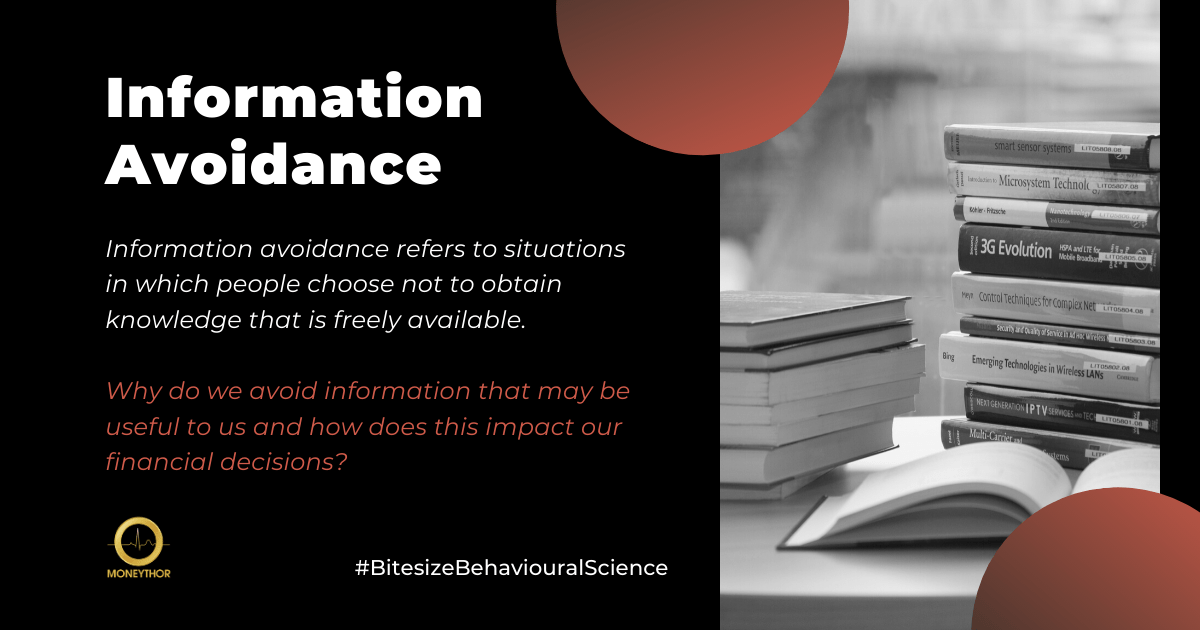How often do you read the terms and conditions when downloading a new mobile app or read the instructions when building Ikea furniture? We live in the information age where we are flooded with more content and data than ever before. In response to this overload we often choose not to take in all the information available to us, this is known as information avoidance. Why do we avoid information that may be useful to us and what impact does this have on our financial decision-making?
What is information avoidance?
Information avoidance in behavioural science refers to “situations in which people choose not to obtain knowledge that is freely available.” What this means is that people will avoid getting hold of information that is free and could possibly improve their decision-making rather than consider the information that is available to them. This theory goes against traditional thinking that people are rational and try to be as informed as possible when making decisions, particularly financial ones, and instead posits that people are more irrational than we think and often make ill-informed decisions. There are countless situations in which people prefer ignorance over knowledge. One example is investors who will avoid checking their investments when they know the stock-market is down, but check it often when they know it is up.
Why do we avoid information?
The old saying goes that “knowledge is power” but if this is true why do people avoid it and choose ignorance in its place? There are a number of reasons why people avoid information including perceived risk and loss, associated stress and anxiety and potential disappointment.
Research shows that people employ a variety of strategies to avoid the experience of negative emotions such as disappointment, stress and anxiety and information avoidance is considered one of these strategies. This is why investors refrain from checking their investments when they know they are down to avoid the potential emotional response.
Another reason for information avoidance is that having the knowledge may force a responsive action or behaviour that a person may want to avoid. For example when a person learns the required amount for a sustainable pension it may obligate them to start saving, something they would have liked to have avoided in the short-term.
What impact does information avoidance have on our financial decisions?
Avoiding information and knowledge can impact our financial decisions in three major ways:
- Avoidance of making financial decisions
Many people lose out on potential financial gains such as higher interest rates on savings or returns from investments because they cannot make a decision on which account type to set up or fund to invest in due to the avoidance of information about their options. Instead of researching account types and investment opportunities people instead choose not to invest or move their money at all which leads to future loses.
- Limited financial awareness
Similar to the investors who choose not to check their investments when markets are down, people choose not to track their financial standing when they know they have overspent or don’t have much money left in their account. This lack of knowledge can lead to poor financial decision-making and make it more difficult for people to be financial stable.
- Lack of financial education
The avoidance of information and knowledge naturally leads to an overall lack of education about the various financial products and services available to people. Not understanding the fee or interest structure of certain banking products can cause people to select products and services that don’t suit their financial needs. Added to that by not understanding the importance of financial planning and management, people may find themselves in a difficult situation when they reach financial milestones such as buying a home or reaching retirement.
How can banks help people to overcome information avoidance?
The sheer amount of information available to people is one of the key reasons why we avoid it. Banks should use data analytics to provide their customers with personalised, concise and actionable pieces of content that guide them to make better financial decisions, educate them on financial options and encourage them to manage their finances better.
Using tools like predictive money management, savings goals and gamification, banks can create a fun and efficient ways for their customers to learn more about their finances and their financial options.
At Moneythor we work with leading banks to provide personalised recommendations, insights and nudges that drive digital engagement and improve how customers manage their finances.

